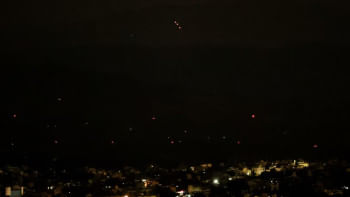In Pakistan, questions raised over GE's flagship power turbines
General Electric's flagship gas turbines ran into problems in Pakistan earlier this year, leading to delays and lengthy outages at three newly built power stations, according to several senior Pakistani officials and power executives.
GE has said they were teething problems. But the questions over one of its most important products suggest another setback for the company in a year in which its shares have plunged and third-quarter results were called "horrible" by new Chief Executive John Flannery. GE is now undergoing major restructuring.
There is no evidence that GE's 9HA-Class turbines have fundamental design flaws.
But so far the Pakistani plants, which began running this year, are producing power at levels well below their capacity and the problem was acute in the crucial summer months, when temperatures in the country frequently exceed 40 degrees Celsius (104°F).
Data from Pakistan's Central Power Purchasing Agency, seen by Reuters, showed the Bhikki, Haveli and Balloki plants jointly generated only a half of their current maximum capacity in August.
A month later all three plants showed improved output but remained well below capacity. Reuters was unable to review more recent data.
"It had terrible consequences because we lost a lot of power which would have come to the grid during the peak summer," Yousaf Naseem Khokhar, the top civil servant in the Energy Ministry's power division, told Reuters.
"It is now up to General Electric to rise to the challenge and to take care of these issues... before next summer starts," he said.
In a statement sent to Reuters, GE said "every commercial HA site today is demonstrating exceptional performance levels for both output and efficiency".
On the issues in Pakistan, GE said: "We've encountered and communicated openly about launch challenges and readily resolved issues during this time. It's important to note that challenges are common with power plants of this size and complexity during the commissioning and early operations phase."
GE also said in a separate statement that the three plants are expected to deliver enough power to supply the equivalent of 7.3 million Pakistani homes over their 30-plus-year life cycle, and that will make a "meaningful difference in the everyday lives of the people of Pakistan."
The 9HA-class gas turbines, the GE power division's newest and most prestigious product, entered the Guinness World Records last year for efficiency, based on the amount of electricity generated from natural gas at the power plant in Bouchain, France, where it was first put into commercial operation in June last year.
Both the 9HA and the 7HA turbines - the A stands for air-cooled - are in tough competition with similar products made by Germany's Siemens, Japan's Mitsubishi Hitachi Power Systems - a joint venture between Mitsubishi Heavy Industries and Hitachi - and Italy's state-controlled Ansaldo Energia.
Flannery said in a GE investor presentation in November that "resolving initial launch issues" with HA class gas turbines would be a future priority.
GE's shares have fallen more than 40 percent this year, and the 125-year-old company announced this month it was cutting 12,000 jobs in its power division, about a fifth of the workforce, to cut costs.
Operating profit of the power division, once the strongest part of GE's operations, fell 51 percent in the third quarter against the year-ago period. Flannery said the division, which brought in 28 percent of GE's revenue last year, was "challenged" but could be turned around in one or two years.
Pakistan, desperate for additional electricity to avoid crippling blackouts, teamed up with GE to build the power stations at Bhikki, Haveli and Balloki, all in the most populous province Punjab, at breakneck speed.
GE won the contracts to supply Pakistan with six turbines for the three power plants in 2015, based on the lowest priced deal per megawatt of capacity.
The first problem was the deliveries were delayed by up to three months and missed some of the summer months this year, several Pakistani officials said. They said they were told the delays happened because a part of the turbine needed further testing.

 For all latest news, follow The Daily Star's Google News channel.
For all latest news, follow The Daily Star's Google News channel. 



Comments